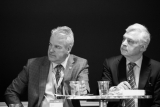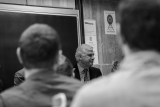Backed by his extensive experience as the Director of International Affairs and of the program Places at the Young Foundation (London), as the Senior Advisor to the Executive Office of the Basque President, and as a co-founder of SILK, a social innovation laboratory in Basque Country, Gorka Espiau brings to Montréal and CIRM an international outlook on the social transformations taking place in the city.
Follow Gorka Espiau on the Web: personal blog | Twitter
2016-2017
Over the course of the 2016-2017 academic year, Gorka Espiau travels between Montreal, London, and Bilbao, where he contributes most notably to the work at the Agirre Lekendakaria Center for Social and Political Studies. In incorporating his duties as the Professor of practice of the McConnell Foundation program at CIRM, Gorka Espiau has several projects underway.
Montreal Manifesto for Social Innovation Series
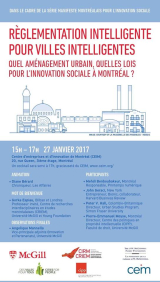
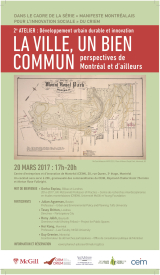

He organized a series of workshops titled Montreal Manifesto for Social Innovation alongside the principle researcher of the program, Professor Hoi Kong of the Law Faculty. These workshops, taking place over three sessions, focus specifically on the ways in which personal narratives relate to collective transformation processes.
On January 27, 2017, the first workshop in the Montreal Manifesto for Social Innovation series, called Smart Regulation for Smart Cities (Règlementation intelligente pour villes intelligentes), brings Gorka Espiau, Mehdi Benboubakeur (Montreal Director), John Geraci (Entrepreneur), Peter V. Hall (Urban Studies Program, Simon Fraser University), Pierre-Emmanuel Moyse (Montreal Director, Centre for Intellectual Property Policy (CIPP), Law Faculty, McGill University) together with panelists. The discussion is led by Diane Bérard (Columnist, Les Affaires), and closing remarks are made by Angelique Mannella (Associate Vice-Principal of Innovation, McGill University).
The second session of the series opens the floor to the foreign researches who come to share their expertise related to Urban Sustainable Development and Innovation. The City as a Commons – Perspectives from Montreal and Elsewhere. The discussion on March 20, 2017 is led by Ron Rayside (architect) with Gorka Espiau, Julian Agyeman (Urban and Environmental Policy and Planning, Tufts University), Tessy Britton (Participatory City, London), Rony Jalkh (Visiting Fellow, Beirut), Hoi Kong (Faculty of Law, McGill University), along with closing remarks by Danielle Lussier (Bureau du développement durable, Ville de Montréal).
The series closes on May 9, 2017 with a conference with the 85th ACFAS (Association francophone pour le savoir) Congress. The event, titled The future of local communities: municipalities at the heart of social and technical innovations, addresses municipal innovation and brings together researchers and municipal representatives over the course of two round tables.
First round table on "L'innovation municipale : sa pratique et ses enjeux." Discussion led by Gérard Beaudet (Urbanism, University of Montreal), with Bernard Sévigny (President of the Union des municipalités du Québec and Mayor of Sherbrooke), Gorka Espiau (Professor of Practice, CIRM), Peter Trent (Mayor of Westmount) and Michel Angers (Mayor of Shawinigan).
Second round table on "L’innovation municipale : recherches et concepts." Discussion led by Richard Shearmur (School of Urban Planning, McGill), with Guy Chiasson (Centre de recherche sur le développement territorial, UQO), Marie-José Fortin (Développement régional et territorial, UQAR), Dany Fougères (Département d'histoire, UQAM) and Diane-Gabrielle Tremblay (Research Chair of Enjeux socio-organisationnels de l’économie du savoir, TELUQ).
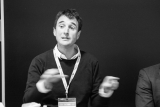
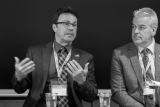
(From left to right - first line: 1. Gorka Espiau 2. Bernard Sévigny and Peter Trent. Second line: 1. Michel Angers and Bernard Sévigny 2. The public listening to Mr.Trent)
Conferences and Teaching
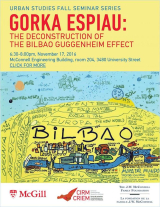 During his stays in Montreal, Gorka Espiau also prioritizes his teaching and the transfer of knowledge. He is a lecturer at the School of Urban Planning at McGill University. During his lecture on November 17, 2016, titled “The Destruction of the Bilbao Effect,” the Professor of practice expanded on the political, economic, social, and cultural contexts that encouraged a movement for innovation and transformation in the city of Bilbao.
During his stays in Montreal, Gorka Espiau also prioritizes his teaching and the transfer of knowledge. He is a lecturer at the School of Urban Planning at McGill University. During his lecture on November 17, 2016, titled “The Destruction of the Bilbao Effect,” the Professor of practice expanded on the political, economic, social, and cultural contexts that encouraged a movement for innovation and transformation in the city of Bilbao.
As part of his seminar, “Capturing the Narratives and Stories of Innovation” (URBP 542), in the Winter 2017 semester, the Professor of practice also shared the results of his most recent work on the theory of change and transformation of cities with future urban planners at McGill University. Social innovation, ethnographic study, and the construction of social movements that lead to the transformation of cities are just some of the subjects that were covered over the course of four sessions—January 25 and 26, and February 1 and 2, 2017—by Gorka Espiau.
Listening to Montreal: Transforming the city
In addition, as the Professor of practice of the McConnell Foundation, Gorka Espiau is involved with the organization Amplifier Montréal, whose ethnographic work aims to better understand the collective narrative of the citizens of a given place. While the first experiment focused on Place Émilie-Gamelin, the second, for which Gorka Espiau offered his expertise and advise during the summer of 2017, widened to a Montreal neighbourhood: Côte-des-Neiges (AmplifierCdN). This approach stems from a more large-scale initiative, Listening to Montreal, which defines itself as “a new urban commons that will amplify the ongoing work of listening to the city for collective action and social change.”
2017-2018
For a second consecutive year, Gorka Espiau continues to work with numerous researchers, practitioners and field organizations, both locally and internationally, to contribute to the social transformation of the city.
The Montreal Observatory of Social Issues
Gorka Espiau contributes to the conceptualization and creation of a structuring project of the CIRM: the Observatory of Montreal's narratives. It is a tool for analysis, interpretation and visualization of common narratives that can act as a lever for social transformation of neighbourhoods and cities. These data will come from numerous collaborations established with different community and municipal actors in the metropolis as well as from the interdisciplinary research community. Gorka Espiau will participate in a series of Observatory design workshops during the 2018-2019 academic year. He also continues to raise awareness of the project abroad and build an international learning platform on tools useful for city transformation.
Conferences and teaching
Seminar on Innovation Communities
CIRM's Professor of Practice continues his collaboration with Hoi Kong (Faculty of Law, McGill) to publish a collective based on the series Montreal Manifesto for Social Innovation, three workshops that took place in 2017. The volume will be published in 2019. On October 13th, 2017, Gorka Espiau participates in a discussion on the book, Les communautés d’innovation. De la liberté créatrice à l’innovation, led by Richard Shearmur (School of Urban Planning, McGill), with Rami Bebawi (KANVA), Diane de Courcy (Je fais Mtl/City of Montréal), Zoé Gagnon-Paquin (Magnéto), Pierre Emmanuel Moyse (Faculty of Law, McGill), and Julie Aurore Rijpens (SIIL, McGill), in the presence of Laurent Simon (HEC), who co-edited the work with Patrick Cohendet (HEC), and Benoit Sarazin. He also speaks during the round table titled “From Big Data and Open Data to Community Actions and Impacts. Which Practices to implement?” on February 20th. The session is moderated by Jayne Engle(Program Director, Cities for People, McConnell Foundation and Adjunct Professor, School of Urban Planning, McGill) along with panelists Stéphan Guidoin (Director, Montréal, Smart City), Charles-Antoine Julien (Assistant Professor, School of Information Studies, McGill), Jean-Noé Landry (Executive Director, Open North), Pierre Luc Bacon (PhD Student, School of Computer Science, Reasoning and Learning Laboratory, McGill), Geneviève Boisjoly (PhD Student, School of Urban Planning, McGill), and Vincent Thomas (Dean, Faculty of Law-Economics and Political Sciences, Dijon).
Innovation Week
As part of Innovation Week, co-organized by the Centre for Intellectual Property Policy, the Centre for International Governance Innovation and the Stikeman Chair, Gorka Espiau is speaking at the February 20 roundtable discussion entitled "Using megadata and open data in the context of metropolitan governance. What practices should be implemented? The session is chaired by Jayne Engle (Director, Cities for All Program, McConnell Foundation and Associate Professor, School of Urban Planning, McGill), with interventions by Stéphane Guidoin (Director, Smart and Digital City, City of Montreal), Charles-Antoine Julien (Assistant Professor, School of Information Studies, Jean-Noé Landry (Executive Director, Nord Ouvert), Pierre-Luc Bacon (PhD student, School of Computer Science, Reasoning and Learning Laboratory, McGill), Geneviève Boisjoly (PhD student, School of Urban Planning, McGill) and Vincent Thomas (Dean of the UFR Droit-sciences économique et politique, Dijon).
The Shaping Neighbourhoods Series
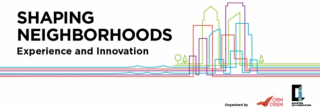 From April to June, CIRM and the Quartier de l’innovation (QI) are putting together a new kind of experiential meetings which address local innovative initiatives related to urban life. Shaping Neighbourhoods: Experience and innovation is a series of “experience-conferences” that encourage communities in the city to (re)discover urban planning projects and to engage in conversations around community projects, university research, and municipal initiatives that are taking place there.
From April to June, CIRM and the Quartier de l’innovation (QI) are putting together a new kind of experiential meetings which address local innovative initiatives related to urban life. Shaping Neighbourhoods: Experience and innovation is a series of “experience-conferences” that encourage communities in the city to (re)discover urban planning projects and to engage in conversations around community projects, university research, and municipal initiatives that are taking place there.
Gorka Espiau participates in the first of the three experience-conferences, Build, which takes place on April 17th and which focuses on the creation of shared spaces. This discussion, led by Richard Shearmur (School of Urban Planning, McGill), takes place at the Wellington Control Tower and at Project Young, with Philémon Gravel (Cofounder, Entremise), Pauline Butiaux (Development Director, Wellington Control Tower), Jonathan Cha (Lecturer,Département d’études urbaines et touristiques, UQAM), Carla Rangel (Development Director, Wellington Control Tower), and Marie-Philip Roy-Lasselle (Project Manager, Service des partenariats et du soutien à l’innovation, UQAM).
URBP 542: New Social Innovation Dynamics
During the Winter 2018 semester, Gorka Espiau teaches a one-credit course in the School of Urban Planning at McGill University that demonstrates how social innovation, on the community level, contributes to the positive and systemic transformation of a community.Students are invited to challenge traditional approaches to innovation, which often rely on the myth of the “solo entrepreneur.” More specifically, they observe, through case studies and the studies of pilot projects carried out in Bilbao (Basque Country) and in Côte-des-Neiges (Montreal), the different ways in which community narratives are produced and captured, as well as reflect on how to co-create new initiatives or concrete actions likely to generate broad and inclusive benefits for communities based on story analysis. The course is thus designed to allow students to improve their ability to deconstruct the detrimental narrative that ordinary citizens are not perceived as “change-makers” or “innovators” and to explore various theories of change and innovative practices.
Collaboration with the McConnell Foundation
Amplifier Montréal
After having provided his expertise to the ethnographic work carried out by Amplifier CdN in the summer of 2017, Gorka Espiau is still contributing to the processes of innovation and social transformation underway in Côte-des-Neiges, due to to the commitment and vision of many neighbourhood actors, including the Table de quartier. In collaboration with Lyne Poitras and at the request of the McConnell Foundation, he has written a report that illustrates what concrete actions can be introduced into the neighbourhood ecosystem, stemming from ethnographic listening and responding to needs, challenges, and aspirations of the citizens.
The Countless Rebellions Series
The McConnell Foundation aims to share the acquired expertise on how social change is generated through the project Countless Rebellions, a series of interviews that explores social innovation and systemic change. Discover their interview with Gorka Espiau here.
The Observatory of Montréal’s Narratives
Gorka Espiau contributes to the conceptualization and creation of the Observatory of Montreal’s Narratives. It is a tool for analyzing, interpreting and visualizing narratives that can act as a positive lever for the social transformation for neighbourhoods and cities. The data will come from numerous collaborations established with the various community and municipal actors of the metropolis as well as the interdisciplinary research community. Gorka Espiau will participate in a series of Observatory design workshops during the academic year 2018-2019. He also continues to publicize the project abroad to build an international platform for learning about tools that could be useful for the transformation of cities.
Memorandum of Understanding: CIRM and the Agirre Lehendekaria Center
Through the work conducted at CIRM and at the Agirre Lehendakaria Center for Social and Political Studies in the Basque Country, Gorka Espiau facilitated the creation of a memorandum of understanding between the two centres as well as the Etxepare Basque Institute. Theses agreements are signed on April 20th, 2018, aiming to foster collaboration and cooperation between these institutions and their social innovation projects, comparing the case of the Basque Country and to that of Montreal and the province of Quebec.
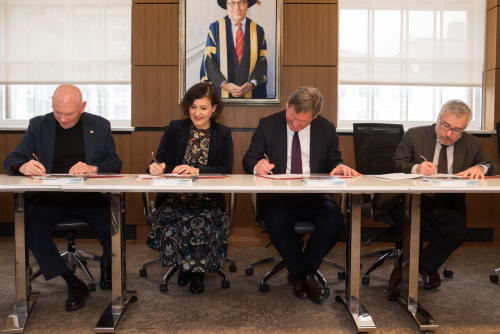
Signing ceremony of the Memorandum of Understanding, April 20, 2018. From left to right: Juan José Ibarretxe, Irene Larraza, Bingen Zupiria, and Philip Oxhorn, respectively the Director of the Agirre Lehendakaria Center, the Director-General of the Etxepare Basque Institute, the Basque Minister for Culture, and the Associate Provost (International) of McGill University.
2018-2019
The 2018-2019 academic year marks the end of Gorka Espiau’s tenure as CIRM Professor of Practice, a final year filled with networking and teaching activities to crystallize long-term collaborations with the center and its partners
Conference: Le Virage - Campus MIL
On September 13, 2018, Gorka Espiau gave two lectures as part of the major evening conferences organized by Le Virage - MIL campus of the Université de Montréal. In this double format, he focused on Basque transformation from a social innovation perspective ("The Bilbao Effect. Deconstructing the Basque transformation"). This first presentation allowed him, among other things, to challenge the dominant narrative that the transformation of Bilbao was possible thanks to local elites who overcame public opposition. In his second lecture, "New community listening tools for building large scale Social Innovation Platforms", he explored how lessons learned from the Bilbao/Basque transformation are feeding into open innovation platforms in the UK, Peru, India, Mozambique and Montreal. This was followed by a moderated dialogue in an exclusive cocktail format, followed by an open-air conference on the MIL campus esplanade.
Teaching Social Innovation: A New Approach
At the invitation of Richard Shearmur, Director of McGill University's School of Urban Planning, Gorka Espiau joins Jayne Engle, Director of the McConnell Foundation's Cities for All program, to offer a seminar dedicated to social innovation. This semester of presentations and hands-on work, developed and delivered with six hands, highlights different transformative initiatives from cities here and abroad and allows students∙e∙s to learn about theories of change, citizen mobilization, and different social innovation processes adapted to their urban and socio-economic context. This collaborative teaching experience also secures Gorka Espiau a place on the teaching staff of the École d'urbanisme as a visiting professor ("adjunct").
A CIRM visit to the Basque Country
Finally, Gorka Espiau continues to support CIRM in its reflections leading to the conceptualization and creation of its Observatory of Montreal Stories. While CIRM is committed to including the Observatory in the City of Montreal's application to Infrastructure Canada's Smart City Challenges, Gorka Espiau is sharing the learnings he has gained from a process of deep listening deployed in the Basque Country and on a smaller scale in certain neighborhoods of the Quebec metropolis to the City of Montreal and the Centre. This sharing of learnings intensified, moreover, in December 2018, during a tour he organized for the CIRM team in the Basque Country during which the Agirre Lehendakaria Center, the University of Mondragon, the city of Donostia-San Sebastián and CIRM were invited to present their respective social innovation platform projects and to exchange on the levers and brakes to their deployment. The CIRM team - Pascal Brissette (director), Stépan Gervais (scientific coordinator), Audray Fontaine (knowledge transfer coordinator), Victoria Svaikovsky (administrative assistant) - is accompanied by its partner, Luc Véronneau (Véronneau Techno. Conseil), and is guided throughout this stay by Gorka Espiau and Itziar Moreno (ALC)
Schedule
December 10 : MONDRAGON. An Open Innovation Platform for Social transformation has been created in the Mondragon Valley (Debagoiena) in order to tackle current and upcoming problems (climate change, future of work, big data) in an innovative way. The purpose of your one-day visit is to share your work and exchange experiences.
- Brief presentation with Ibon Antero, coordinator of Social Transformation at Mondragon Corporation.
- Public conference in San Sebastian: Big Data for Social Transformation, with Gorka Espiau, Humberto Bustince (Public University of Navarre), Eva Salaberria (San Sebastian City Council), Matthew Claudel (MIT) and Audray Fontaine (CIRM - McGill University).
December 11: DONOSTIA – SAN SEBASTIÁN. ALC and the Donostia City Council are setting up a listening platform pilot in some areas of the town (population 186,000). The main goal is to get a broader and deeper picture of the citizen’s narratives, beliefs and necessities, in order to tackle them through co-creation processes.
The pilot will combine traditional listening tools (ethnographic observation, semi-structured qualitative interviews, focus groups and participatory activities) with a digital listening tool that will monitor different sources (social media, text, audiovisual materials, statistics, and available municipal data that nobody is using) and turn them into information that can be analyzed, materializing it on a digital interface available for everyone involved. The purpose of your visit is to share your work on this big data field and seek collaboration opportunities with the Donostia Observatory.
- Open seminar on citizen listening where participants will share their work. Featuring Matthew Claudel (MIT), Roger Warnock (Social Nybble), Jayne Engle (McConnell Foundation), Luc Véronneau, Pascal Brissette, Audray Fontaine, Victoria Svaikovsky and Stéphan Gervais (CIRM – McGill). We expect to invite about 40-50 people, including local experts and city council members. Discussion around the following questions:
- How could cities and social innovation actors use technology and big data, otherwise created by big corporations for profit, to bolster social intelligence?
- How do your tools/platforms/projects respond to this challenge?
- How can we guarantee security and privacy in this context?
- Meeting at San Sebastian City Council to seek collaboration opportunities.
- Open seminar on “Big Data for Social Good” Venue: Mondragon Goi Eskola Politeknikoa, (University of Mondragon). Featuring Matthew Claudel (MIT), Roger Warnock (Social Nybble), Luc Véronneau, Pascal Brissette, Audray Fontaine, Victoria Svaikovsky and Stéphan Gervais (CIRM – McGill). The conference is aimed for the university community as well as the general public.

